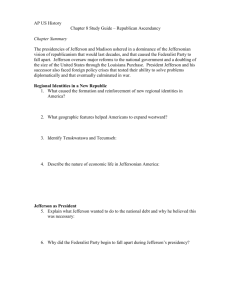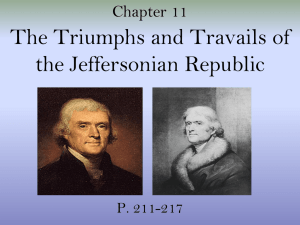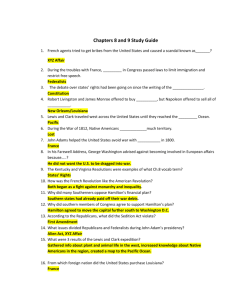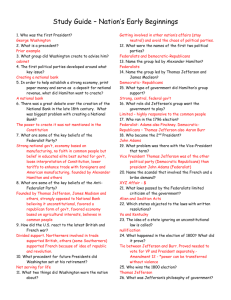unit 3.2 Jefferson - Dover Union Free School District
advertisement
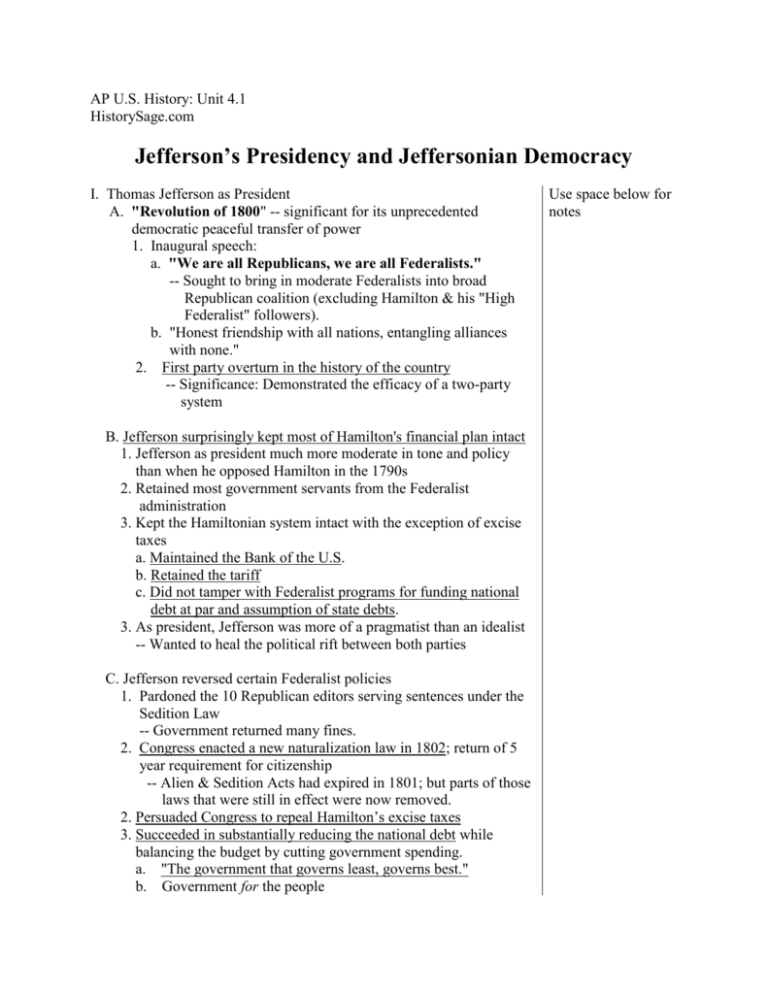
AP U.S. History: Unit 4.1 HistorySage.com Jefferson’s Presidency and Jeffersonian Democracy I. Thomas Jefferson as President A. "Revolution of 1800" -- significant for its unprecedented democratic peaceful transfer of power 1. Inaugural speech: a. "We are all Republicans, we are all Federalists." -- Sought to bring in moderate Federalists into broad Republican coalition (excluding Hamilton & his "High Federalist" followers). b. "Honest friendship with all nations, entangling alliances with none." 2. First party overturn in the history of the country -- Significance: Demonstrated the efficacy of a two-party system B. Jefferson surprisingly kept most of Hamilton's financial plan intact 1. Jefferson as president much more moderate in tone and policy than when he opposed Hamilton in the 1790s 2. Retained most government servants from the Federalist administration 3. Kept the Hamiltonian system intact with the exception of excise taxes a. Maintained the Bank of the U.S. b. Retained the tariff c. Did not tamper with Federalist programs for funding national debt at par and assumption of state debts. 3. As president, Jefferson was more of a pragmatist than an idealist -- Wanted to heal the political rift between both parties C. Jefferson reversed certain Federalist policies 1. Pardoned the 10 Republican editors serving sentences under the Sedition Law -- Government returned many fines. 2. Congress enacted a new naturalization law in 1802; return of 5 year requirement for citizenship -- Alien & Sedition Acts had expired in 1801; but parts of those laws that were still in effect were now removed. 2. Persuaded Congress to repeal Hamilton’s excise taxes 3. Succeeded in substantially reducing the national debt while balancing the budget by cutting government spending. a. "The government that governs least, governs best." b. Government for the people Use space below for notes HistorySage.com APUSH Lecture Notes Unit 4.1 Jeffersonian Democracy c. Secretary of Treasury Albert Gallatin agreed with Jefferson that the debt was more a curse than a blessing; sought to lower national debt significantly -- Debt fell from $80 million to $57 million (even including the Louisiana Purchase). 4. Ended the graduated property tax imposed by "High Federalists" in 1798. 5. Reduced Hamilton’s standing army but upheld need for stronger navy. -- Some Jeffersonians feared that the army was a "High Federalist" center of power and could become a threat to the government in the future. 6. Emphasized states’ rights 7. Encouraged development of an agrarian nation E. 12th Amendment (1804) 1. Tie vote between presidential candidates of same party could no longer cause confusion as it did in the election of 1800. 2. Provision: electors had to specify that they were voting for one presidential candidate and one vice presidential candidate. 3. Jefferson and his VP candidate, Burr, had tied in the 1800 general election 4. Vote sent to House of Reps where Federalists gave Jefferson the presidency. -- Hamilton a major force in the decision; Burr never forgave him. II. John Marshall and the Supreme Court A. Judiciary Act of 1801 1. Federalists created 16 new judgeships and other judicial offices 2. One of last important laws passed by the outgoing Federalist Congress. 3. Adams continued on his last day in office signing commissions of the Federalist "midnight judges." 4. Jeffersonians charged the Federalists of packing the judicial branch. 5. Act repealed by the newly elected Republican Congress in 1802. B. John Marshall 1. Appointed as Chief Justice during last days of Adams' term . 2. Most important chief justice in US history; served about 34 years 3. Maintained Federalist principles in his decisions even after the Federalist party was dead (after 1816). Page 2 Use space below for notes: HistorySage.com APUSH Lecture Notes Unit 4.1 Jeffersonian Democracy C. Marbury vs Madison, 1803 1. Perhaps most important Supreme Court decision in U.S. history 2. "Midnight judge" William Marbury sued (on the behalf of several other judges) for the delivery of his commission that was being held up by the new secretary of state, James Madison. -- Madison was ordered by Jefferson to withhold Adams' appointments under the Judiciary Act of 1801 2. Marshall knew Jefferson administration would not enforce a writ by the Court to deliver the commission to Marbury. -- Case was dismissed, thus avoiding a direct political showdown between the Supreme Court and the Executive branch. 3. Judicial Review a. Marshall ruled that part of the Judiciary Act of 1789, upon which Marbury had based his appeal, was unconstitutional by giving the Court the right to enforce appointments (only the executive branch can enforce the law) b. Marshall gave Supreme Court power to rule a law by Congress unconstitutional c. Contrasted with the Kentucky Resolutions where Jefferson had claimed states had that right (due to compact theory). d. Power of Supreme Court greatly enhanced III. First Barbary War (Tripolitan War) ( (1801-1805) A. Initially, Jefferson reduced the size of the U.S. army due to his distrust of Hamilton's large standing army. -- He also reduced the navy. B. Attack on U.S. ships by pirates of the North African states forced Jefferson to again increase the military. 1. North African states included Algiers, Tripoli, Morocco, & Tunis 2. North African states had for years blackmailed and plundered US merchant ships in the Mediterranean Sea. -- Federalists had been forced to buy protection, especially from Algiers. C. Pasha of Tripoli declared war on the U.S. in 1801 D. Jefferson sent small U.S. navy to Tripoli led by Stephen Decatur. 1. After 4 years of fighting, Tripoli was forced to sign a treaty 1805 2. U.S. attacked other North African corsairs off and on until the War of 1812 (Algiers continued harassing U.S. shipping) E. Jefferson ordered build up a fleet of small gunboats (later criticized as the "mosquito fleet") as it later proved ineffective during the War of 1812 IV. The Louisiana Purchase A. 1800, Napoleon got Spain to cede Louisiana region to France 1. French in 1802 withdrew U.S. right of deposit at New Orleans guaranteed under the Pinckney Treaty of 1795 Page 3 Use space below for notes: HistorySage.com APUSH Lecture Notes Unit 4.1 Jeffersonian Democracy 2. Napoleon seemed to pose a possible military threat to U.S., perhaps forcing the U.S. to make alliances with other European powers for self-defense B. Jefferson sent James Monroe to Paris (to join U.S. minister Robert Livingston) 1. Sought to buy New Orleans and as much land to the east in the Floridas as possible for $10 million. 2. If negotiations failed, they were to forge an alliance with Britain C. Napoleon decided to sell all Louisiana and forego his dream of an American empire. D. Although Livingston initially negotiated for New Orleans, the entire Louisiana Territory was purchased for $15 million. -- About 3 cents an acre! E. Jefferson accepted treaty, albeit reluctantly 1. As a strict constructionist, he believed the Constitution did not authorize the president to negotiate treaties incorporating huge new lands into the U.S. 2. Secretly proposed an amendment to the Constitution to provide for such an act. -- Advisors urged Jefferson to act now before Napoleon changed his mind. 3. Jefferson reluctantly submitted the treaties to the Senate while privately admitting admitting the purchase was unconstitutional. a. Senate promptly ratified the treaty b. Westward-looking Americans enthusiastically supported the purchase F. Federalists opposed the Louisiana Purchase 1. Ironically, argued for strict construction: president did not have power to purchase Louisiana. 2. Ironically claimed Louisiana would cost too much and cause the U.S. debt to soar. 3. Real reason: worried that new western lands would be loyal to the Republicans. G. Most important land purchase in U.S. History 1. Doubled the size of the U.S.for only 3 cents an acre 2. U.S. received western half of richest river valley in the world 3. Guaranteed Mississippi waterway to the Gulf of Mexico including New Orleans 4. Paved way for westward expansion Page 4 Use space below for notes HistorySage.com APUSH Lecture Notes Unit 4.1 Jeffersonian Democracy a. Accelerated rise of U.S. as economic & political power b. Sadly, by 1890 all remaining Native Americans in the West would be killed or forced onto reservations. c. John Jacob Astor formed the American Fur Company in 1808 to tap the newly purchased territory; eventually resulted in U.S. claim to Oregon. 5. Ended European expansion in North America (for the most part) 6. Avoided a possible war with France and an entangling alliance with Britain. 7. Boosted American nationalism a. Federalists now were a mere sectional party in New England b. West was much more loyal to the Union as Jefferson was seen as a hero. H. Exploration of Louisiana Territory (1804-1806) 1. Jefferson interested in finding an all-water route to the Pacific 2. Meriwether Lewis & William Clark appointed to explore the region (Corps of Discovery) a. Trail extended from the Missouri River through the Rockies and along the Columbia River to the Pacific Ocean. b. Sacajawea, a Shoshoni female, became a scout & translator when the expedition reached Bismark, SD for the winter; crucial to its success. 3. Expedition bolstered U.S. claim to Oregon; further opened West to Indian trade and exploration. 4. Jefferson disappointed that an all-water route did not exist V. Essex Junto (1804) & secessionist exploits of Aaron Burr A. Burr ran for president in 1796 and 1800 (became Jefferson’s vice president in 1801) B. Essex Junto: A small group of Federalist extremists plotted New England's secession from the union and the creation of a sevenstate northern confederacy (including NY, NJ, MA, CT, RI, NH, VT) 1. Federalist-dominated New England felt threatened by Jefferson's political dominance & the Louisiana Purchase which would lead to western expansion. 2. Plotters courted Hamilton to run for governor of NY in 1804 and then lead the secessionist movement. -- Hamilton refused—did not see Louisiana as the problem, only the expansion of democracy. 3. Plotters then courted Vice President Burr. 4. Hamilton defeated Burr in the NY gubernatorial election. a. Hamilton then exposed the plot at a meeting of leading Federalists. b. Burr promptly challenged him to a duel and killed him in Page 5 Use space below for notes: HistorySage.com APUSH Lecture Notes Unit 4.1 Jeffersonian Democracy 1804 C. Burr Conspiracy 1. 1806, Burr attempted to separate western part of U.S. and unite it with to-be-conquered Spanish territory west of Louisiana Territory 2. Burr initially supported by James Wilkinson, military governor of upper Louisiana, who later exposed the plot to Jefferson -- Burr arrested in 1806 and tried the following year. 3. John Marshall dropped the case when 2 witnesses for gov't couldn't be found. IX. Embargo Act -- 1807 A. Forbade export of all goods from U.S. 1. Jefferson got Congress to hastily pass the act 2. Reasoned that a U.S. embargo would force Britain & France to respect its rights. 3. Loose construction of the Constitution -- Congress' power to "regulate commerce" meant it could stop exports. 4. Undermined Jefferson’s states’ rights philosophy B. Embargo Act was a disaster to the U.S. economy 1. In 1807 U.S. exports = $108 million ; in 1808 = $22 million a. New England trade most affected b. South & West: mountains of cotton, tobacco, & grain unsold 2. Embargo probably more damaging to U.S. than the British & French threat 3. Illegal trade mushroomed as a result (especially along Canadian border) C. Jefferson got Congress to pass harsh enforcement laws. 1. Viewed by many as tyrannical. 2. New England again talked of secession D. Congress repealed the act in March 1, 1809 (3 days before Jefferson left office) E. Non-Intercourse Act of 1809 replaced the Embargo Act 1. Reopened trade with all nations of the world except France and Britain 2. Remained U.S. policy until War of 1812. F. Reasons for embargo's failure Page 6 Use space below for notes HistorySage.com APUSH Lecture Notes Unit 4.1 Jeffersonian Democracy 1. U.S. overestimated British dependence on American trade 2. Embargo not in effect long enough or administered effectively 3. Embargo Act proved to be three times as costly as war -- U.S. lost opportunity to build a strong navy 4. Worsened the conflict between Britain & France a. Britain hit harder by the Embargo; France supported it b. France seized U.S. ships in French ports that were headed for England. 5. Northeastern Federalists undermined the Embargo through smuggling activities. G. The Embargo Act inadvertently sparked the Industrial Revolution in America. 1. New England forced to become self-sufficient once again. -- Textile factories grew dramatically. 2. Ironically, Jefferson, a critic of industrialization, may have contributed more than Hamilton to its rise in the U.S. H. The Embargo eventually hurt Britain 1. British importers and textile manufacturers saw major losses. 2. Unemployed British workers affected by the embargo petitioned Parliament in 1812 to repeal its Orders in Council. 3. Irony: 2 days before Congress declared war in June 1812, the British foreign secretary announced suspension of the Orders in Council. (telegraph for quick communication not yet invented) I. Election of 1808 impacted by the Embargo Act issue 1. Federalists gained ground in the presidential election although the Republican, James Madison, defeated Charles Pinckney 2. Federalists made significant gains in Congress (although still in minority) and gained control of several state legislatures. X. Jefferson's legacy A. Expansion became prime goal of Jeffersonians 1. Expansion had also been Federalist policy (success was limited) a. Orderly expansion in Old Northwest but not in South b. Northwest not subdued until Battle of Fallen Timbers in 1794. c. Southern conquest difficult due to Spanish presence. 2. Louisiana Purchase essentially ended European expansion in North America. 3. Historically stunning achievement: no society had ever combined indefinite expansion, and supremacy within the hemisphere without building a strong centralized European-style state (big armies, big navy, big taxation) 4. Soft-side of Jeffersonian expansion: invasion of Canada during War of 1812 5. Hard side of Jeffersonian expansion: removal of Amerindians, Page 7 Use space below for notes HistorySage.com APUSH Lecture Notes Unit 4.1 Jeffersonian Democracy blacks, and Spanish (in Florida during Madison and Monroe’s presidencies) a. Empire for liberty was for whites only. -- Jeffersonians believed free blacks should not be allowed to migrate west. b. Failure of gaining Florida in 1810s showed unlimited expansion desires of Jeffersonians. 6. Barbary Wars were an extension of Jefferson’s desire to expand his agricultural empire. 7. Jeffersonian contempt for Spain carried over into Manifest Destiny in 1840s and the conquest of ½ of Mexico's territory. B. Creation of a democratic non-aristocratic government. 1. "Government that governs least, governs best." -- Lowered debt, balanced budget, promoted states’ rights 2. Reduced oppressive aspects of Federalist agenda. 3. The people who owned the state didn’t govern it (like in Europe) 4. Jefferson: real father of two-term presidency? a. He feared more than two terms might lead to dictatorship. b. Washington had stepped down because of age and inter-party bickering. c. Jefferson could easily have served several more terms. d. Yet, Madison, his successor, was a strong Jeffersonian. 5. Retained faith in democracy and common people (despite enormous struggles) C. Total defeat of Federalists by 1816 1. "High Federalists" had been moving toward creation of Europeanlike aristocracy through intermarriage, creation of standing army, and gov’t suppression of political opponents. a. Most high-ranking army officers were Federalists. b. Burr tried to get the ranking officer in U.S. Army, James Wilkinson, to support secession of western territory. 2. Jefferson finally gained a loyal officers officer corps in the military in 1807: a momentous victory for Jeffersonians. D. Jefferson kept the country out of a damaging European war: War of 1812 not until late in Madison’s first term. XI. Jefferson's Presidency (condensed version) A. Peaceful transfer of power in 1801. B. Maintained many Federalist programs: Nat'l Bank, tariffs, funding debt at par, kept most public servants from Federalist administrations. C. Reversed programs: excise tax, pardoned martyrs from the Sedition Act, new naturalization law (5 yrs), reduced the debt and balanced Page 8 Use space below for notes HistorySage.com APUSH Lecture Notes Unit 4.1 Jeffersonian Democracy the budget. D. Supreme Court issues: Marbury v. Madison, impeachment of Chase E. Expansion: Louisiana Purchase F. Tripolitan Wars G. Embargo Act H. "Father of the 2-term presidency" Essay Questions for Review: 1. To what extent were the Jeffersonians successful in achieving their goals between 1801 and 1809? 2. To what extent did President Jefferson stay true to the ideals he held in the 1790s? 3. Evaluate the relative importance of domestic and foreign in issues during 1801 and 1809. 4. By 1809, which party’s goals had prevailed in American politics: the Federalists or the Democratic-Republicans? 5. To what extent and in what ways was Jefferson’s expansionist policies successful? Page 9 Use space below for notes HistorySage.com APUSH Lecture Notes Unit 4.1 Jeffersonian Democracy Page 10 Use space below for notes HistorySage.com APUSH Lecture Notes Unit 4.1 Jeffersonian Democracy Page 11 Use space below for notes




